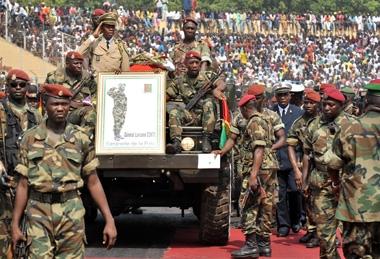NEW YORK - When a disgruntled military force staged a coup in Sudan in the late 1960s, the army officers leading the revolt were so disciplined that the battle tanks rumbling through the streets to the presidential palace in Khartoum stopped at every traffic light scrupulously obeying signals. Or so the story goes.
Last week's coup in Guinea -- the umpteenth military putsch in the sprawling crisis-prone African continent -- was equally restrained. Judging by the initial reports coming out of the capital Conakry, there were no shots fired and no blood on the streets in a performance perhaps worthy of most Western democratic elections.
 |
| Guinean soldiers escort the remains of dictator Lansana Conte during his funeral ceremony on Friday. AFP |
As in most coups, the first casualties were the state-run radio and TV stations because they were the swiftest means of communication to the outside world and the rest of the country.
The junior officers who pulled off the coup in Guinea justified the military takeover on the ground that President Lansana Conte — who died last week, and who himself seized power after the death of Sekou Toure 24 years ago — ruled with an iron fist presiding over a corrupt and badly administered regime.
Since the battle cry of the new government in Guinea is "We want Change", Captain Moussa Dadis Camara, installed as President after the coup, has already been dubbed "Obama Junior", named after the President-elect Barack Obama (who has called for radical political changes in the US).
But ultimately all military rulers — as are most civilian leaders — wind up leading authoritarian, corrupt and inefficient governments. As Alexander Pope once remarked: "For forms of government, let fools contest. Whatever is best administered is the best." The underlying message is that all governments are bad.
In Asia, the military has run — and ruined — governments in several countries, including Burma (Myanmar), Bangladesh, Pakistan, Thailand and the Philippines. General Zia-ur Rahman in Bangladesh reportedly survived some 21 coups against him, with coup plotters coming along a virtual assembly line.
But historically most of the military coups — some bloody, others bloodless — have taken place in the African continent. The countries that have experienced coups include Burkina Faso, Liberia, Sudan, Libya, Algeria, Nigeria, Togo, Uganda, Mauritania, the Democratic Republic of Congo and Guinea.
One of the bloodiest was in Liberia where a junior officer, Master Sergeant Samuel K. Doe, took power, and whose army brutally killed President William Tolbert Jr and publicly executed 13 of his cabinet ministers on a beach in the capital of Monrovia back in 1980.
But when Doe redeemed himself as a Cold War ally of the US, his military government was not only recognized by the West but was also the beneficiary of increased military and development aid from the then Reagan administration. The ultimate redemption came when Doe, who broke diplomatic relations with Libya on the bidding of the US, was a guest of the White House notwithstanding his dubious past.
The coup in Guinea will predictably be condemned by France, (its former colonial ruler), the African Union and the United Nations — all of which believe in Western-style democracy. But the military government's ultimate survival will depend largely on one political factor: its relationship with the Western world and its willingness to play ball with its former colonial master, France.
Zimbabwe's Robert Mugabe, who infuriated the West by his decision to take over lands belonging to British white settlers, is considered a political pariah, despite the fact that he has the overwhelming support of the African Union, including neighbouring South Africa.
The Western world has continued to tighten the screws on Zimbabwe and has publicly called for the resignation of Mugabe blaming him for the country's continued financial and humanitarian crisis. Although he did not come to power through the military, he is fighting a losing battle against vested interests in the West.
Like Zimbabwe, most of the African countries have democratically elected governments, with military rule the exception. But corruption and maladministration are common to both military and civilian regimes — irrespective of whether the countries are in Africa, Asia or Latin America.
Former UN Secretary-General Kofi Annan, himself an African, once lambasted African leaders who subvert democracy and who line their pockets with public funds. He said "billions of dollars of public funds continue to be stashed away by some African leaders — even while roads are crumbling, health systems have failed, school children have neither books nor desks nor teachers, and phones do not work." Annan also criticised African leaders who overthrow democratic regimes to grab power by military means.
Salim Ahmed Salim, the Secretary-General of the Organization of African Unity, the predecessor of the AU, said at that time that Annan was lucky, "because anybody else would have been lynched for saying so."
But ultimately the OAU summit in Algiers unanimously decided to bar all military leaders from future meetings. That decision still stands. Since then, when African governments have changed unconstitutionally, there has been strong international pressure to ensure the speediest possible return to legitimacy. Still, Annan's proposal calling on the General Assembly to bar military leaders from the UN did not gather any political momentum since there have been no takers. | 
